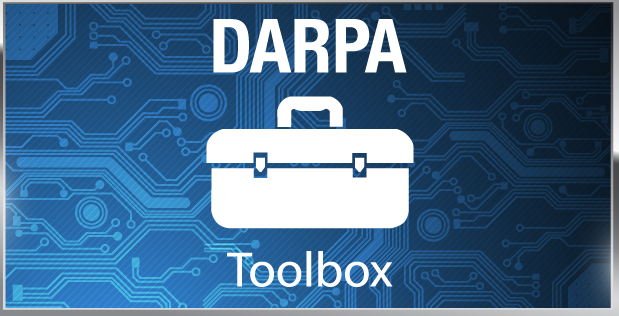New initiative aims to lower high barrier to entry for resource-constrained organizations, increasing access to participate in forward-looking research
OUTREACH@DARPA.MIL12/16/2020

As the world continues to change and advance at a rapid pace, the need for continuous innovation has never been greater. DARPA’s open innovation model leverages the expertise and novel ideation found in large and small businesses, government organizations, and academic institutions. However, resource constraints across these organizations can limit their participation in cutting-edge research opportunities. Within the microelectronics arena in particular, skyrocketing costs for designing integrated circuits are stifling participation in the innovation process.
To help remove potential roadblocks to further increasing the speed of innovation, the agency today announced DARPA Toolbox – a new, agency-wide effort to provide open licensing opportunities with commercial technology vendors to the researchers behind DARPA programs. Through DARPA Toolbox, successful proposers will receive greater access to commercial vendors’ technologies and tools via pre-negotiated, low-cost, non-production access frameworks and simplified legal terms. For commercial vendors, DARPA Toolbox will provide an opportunity to leverage the agency’s forward-looking research and a chance to develop new revenue streams based on programmatic achievements developed with their technologies.
“DARPA performers are frequently encumbered by having to negotiate access to tools, IP, and services, and execute complex legal agreements that take the time away from what they do best – advancing science to benefit the nation,” said Serge Leef, the Microsystems Technology Office (MTO) program manager spearheading this effort. “Through DARPA Toolbox, we are working to effectively lower the high barrier to entry with the goal of encouraging more proposals from non-traditional and resource-constrained organizations that can bring innovative insights and ideas to bear on DARPA programs.”
DARPA Toolbox will provide researchers with access to select vendor tools and technologies throughout the life of their contractual relationship with the agency. Commercial vendors are expected to provide licensing of their tools at the team level, which includes a prime contractor and its subcontractors working on DARPA programs. This initiative will benefit existing research teams but is also intended to help potential proposers. Prior to submitting to an open opportunity, researchers will be able to see what tools, IP, and services might be available to them and can use that insight to inform their submissions and assess their costs.
Commercial vendors similarly will benefit by gaining insights into DARPA innovations and research findings by creating non-production business models and legal terms that more closely support DARPA research teams’ needs and use cases. In addition, these vendors benefit once a program concludes as they would be able to sell their commercial products for production use to transition organizations. Through licensing agreements and collaborations with DARPA-funded innovators, vendors can potentially create new products, enhance existing solutions, or find additional ways to generate new revenue streams. By supporting DARPA, they also have an opportunity to contribute to our national security.
“There are a number of mutually beneficial outcomes available to our performers as well as commercial vendors through this framework,” noted Leef. “However, the greatest benefit will be our ability to tackle difficult technical challenges with increased speed, agility, and novel approaches to problem solving.”
In August, the first commercial partnership under DARPA Toolbox was announced with Arm in advance of the third annual DARPA ERI Summit. The three-year agreement makes all commercial Arm products available to DARPA researchers.
Verific and CEVA recently signed-on to DARPA Toolbox as well. Researchers will now have access to Verific’s electronic design automation (EDA) software for the duration of their involvement with a DARPA program. Access to Verific’s SystemVerilog parsers and elaborators can help research teams accelerate their time to innovation by eliminating the need to develop front-end EDA software on their own. Similarly, researchers will have access to CEVA’s wireless connectivity and smart sensing technologies. CEVA is a licensor of Digital Signal Processors, AI processors, wireless platforms, and complementary software for sensor fusion, image enhancement, computer vision, voice input, and artificial intelligence. As licensees of CEVA IP, DARPA researchers working on technical areas that range from 5G baseband processing to computer vision will stand to benefit.
While the commercial tech licenses are expected to be deeply discounted, the contracted research teams will be responsible for costs associated with certain technical services. However, researchers will have the option to work with DARPA to secure additional funds to cover these costs on a case-by-case basis. Once a given DARPA program concludes, continued work or licensing of the vendors’ tools will need to be coordinated directly with the vendor.
